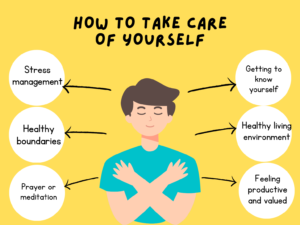Steps to Reduce Your Stress and Improve Your Mood: Stress Management Guide
Introduction
Stress is a normal part of life. It’s what we do with it that matters. We all experience stress at some point, but it can lead to long-term health problems if you don’t learn how to manage it effectively. Stress management is about developing strategies for managing your stress and feeling in control of your life situations.

Physical Effects of Stress
The physical effects of long-term stress are many. Stress can cause you to feel tired. It’s not surprising that stress, which causes a release of adrenaline, will make you feel tired. Stress also causes your body to produce cortisol, which is a hormone that makes you feel tired.
Stress can cause loss of sleep and irritability. When your brain is under stress, it doesn’t need much time before it starts feeling agitated and irritable – even when there isn’t anything wrong with the situation at hand!
Stress can cause forgetfulness (or amnesia). Research shows that if you’re stressed out during an exam or interview—even if you know all the information inside-out—your brain might still process what’s happening differently than usual because it doesn’t have enough space for all those new feelings about being stressed!

Stress can raise blood pressure and blood sugar levels (causing diabetes), as well as affect the heart muscles. This makes them weaker over time so they’re more likely to suffer from heart disease later on in life too! An increase in heart rate is also the usual symptom of stress.
Chronic stress can cause headaches, insomnia, and other sleep disorders. When you’re stressed, your body needs more energy to keep working properly. When it doesn’t have enough energy, it can cause headaches and other physical symptoms like feeling sick or having muscle aches.
Emotional Effects of Stress
Stress can have a significant emotional effect on your mental health. Stress can make you feel anxious, depressed, and overwhelmed like you’re going crazy or losing touch with reality.

When stress takes hold of your mind, it’s easy to lose perspective. You may feel as though there is no way out of this situation and that you will never be happy again. Or perhaps your emotions are so intense that they seem stronger than usual—you might cry easily or feel an extreme sense of anger or sadness in response to something that normally wouldn’t bother you very much at all. All these can disturb the quality of life.
Easy-to-do methods and techniques
Given below are simple and easy methods. You can apply these techniques by yourself.

1. Avoid unhealthy coping mechanisms.
It can be tempting to deal with stress by eating, smoking, drinking alcohol, or engaging in other addictive behaviors. These habits may seem like a way for you to cope with the stressors in your life but they can make things worse. Researchers have found that people who use unhealthy coping strategies are more likely to develop problems such as insomnia and depression than those who don’t use these approaches. So it’s important not only to limit your exposure to stressful situations but also to reduce the number of negative feelings that come from them by trying healthier approaches instead!
2. Figure out your stress triggers.
The first step in stress management is to figure out what’s causing you to feel stressed. This can be a physical, mental, emotional, or environmental thing that happens. Stress triggers could be as simple as having a busy day at work or school where you didn’t get enough sleep the night before and find yourself feeling overwhelmed by all of the tasks ahead of you. It could also be something more complex like being involved in a traumatic experience that has left you feeling scared and helpless. It could even be something as simple as being in a bad mood because somebody said something means about your favorite sports team!
There are many different types of stressors (the thing that causes stress). Stressors include things such as work deadlines, financial problems, illness, or injury/pain/disability…
3. Take care of your physical health.
Physical health is a key component of good mental health. Taking care of your body will help you stay calm and relaxed, which will reduce your stress levels. One way to do this is by eating healthy foods such as fruits and vegetables, whole grains, lean protein sources like chicken or fish, low-fat dairy products (like yogurt), and water — make sure you’re drinking plenty of it! You may also want to consider exercising regularly by doing activities that you enjoy doing for about 30 minutes per day at least five days per week. Another great way to reduce stress is by getting enough sleep: ideally seven to nine hours per night! Physical activity and a healthy diet are very helpful in managing stress
Getting enough sleep isn’t as easy as just going to bed earlier. There are also some things that you can do before bedtime. For example: avoid alcohol and caffeine after dinner; turn off all electronics at least an hour before going to bed; try reading a book instead of watching TV—if possible choose something calming rather than exciting (no sci-fi thrillers!).
Remembering these tips will help ensure that each night ends well so that when morning comes around again there won’t be any unnecessary stressors weighing down on top of what already exists during waking hours.”
4. Identify what you can and cannot control.
- You can’t always control how others treat you, but you do have control over how you react to them.
- You cannot change the past, but you can learn from it and make better choices in the future.
- What happens in your life is not always under your control, but what happens inside of you is always up to you.
5. Stay connected to the people who support you.
One of the most common causes of stress is isolation, which can make you feel like you’re all alone in your struggle. When we’re disconnected from others and unable to rely on them for support, we may rely on ourselves instead—and this can be a recipe for burnout.
You’ll want to avoid situations that leave you feeling isolated or alone. Consider spending time with family and friends who are supportive; avoid toxic people who drag you down, and make an effort to build new relationships with people who challenge you and add value to your life.
6. Build a healthy stress management kit.
The best way to reduce your stress and improve your mood is to build a healthy stress management kit. This kit should include items that help you relax, such as tea or chocolate, but also things that are nourishing and comforting, like food or blankets. It should also include items that are calming and relaxing, such as candles or music. The goal is to create a space where it’s easy for you to find what you need when you’re stressed out so that it becomes second nature to use them regularly as part of your self-care routine before or after stressful situations occur.
If this all seems overwhelming at first glance, start by making a list of everything in your house related specifically to relaxation (e.g., tea bags) and then add any other items on the list which would fit into one category (e.g., chocolate). Then organize those lists according to what makes sense when grouped (e g., teas with different flavors may be stored together.)
Advanced Methods and techniques
- Cognitive Behavior Therapy (CBT) is a form of psychotherapy that helps to change the way you think about and respond to situations.
- Relaxation Techniques: These can include deep breathing, meditation, or visualization.
- Assertive Skills Training: This addresses how people communicate their needs and wants so that they can get what they want without hurting others or feeling guilty about it.
- Role of Medicine in Stress Management: Medications such as antidepressants may be prescribed if medications are needed
Role of Cognitive Behavior Therapy
When you are stressed, it is common to have negative thoughts about your situation. These can be thoughts like “this is going nowhere” or “I’ll never get over this”. CBT helps you to identify and challenge these negative thoughts, which in turn reduces your stress levels.
CBT encourages you to think about the bigger picture, rather than focusing on the small details (e.g., a friend not texting back). By challenging these negative beliefs, you will feel less stressed and more able to manage situations appropriately.
Relaxation Techniques
Stress management is an important part of our lives. It affects all areas of our lives and can be a contributing factor to many physical, mental, and emotional problems. Relaxation techniques are one of the most popular ways that people try to manage their stress levels. If used regularly, they have proven effective in reducing stress levels and improving moods for most people.
Meditation for Stress Management
Meditation is one way that you can learn how to relax effectively by teaching yourself how to focus your mind on something other than your worries or daily tasks. This will help keep negative thoughts from getting out of hand when you need them most – at work or during stressful situations with family members or friends who may bring up issues that cause more stress than necessary! Guided Imagery for Stress Management Guided imagery is another great way for people with anxiety disorders like panic attacks because it allows them control over what images they see in their heads which means no surprises coming up from nowhere while they’re trying so hard just get through each day without breaking down completely under pressure. Breathing exercises during stressful times can help a lot.
Assertive Skills Training
Assertiveness is a type of communication that is honest, direct, and respectful. It’s a way to express your needs and wants in a way that does not infringe on the rights of others.
To be assertive means:
- To respect yourself and your feelings without blaming yourself for other people’s behavior or making excuses for them;
- To be willing to speak up about what you want or need;
- To listen carefully to what others have to say;
- To ask questions when you don’t understand something;
- And if necessary, saying no when appropriate.
Role of Medicine in Stress management
Several medications can help manage stress. These medications may be prescribed by your doctor and include:
- Antidepressants (such as selective serotonin reuptake inhibitors, or SSRIs)
- Anti-anxiety drugs (such as benzodiazepines)
If you’re already taking medication for stress, it’s important to talk with your doctor before trying out any new ones. While certain over-the-counter supplements might help boost your mood in the short term—like omega 3 fatty acids or vitamin D—they won’t work well if taken on top of prescription drugs. Likewise, nonprescription remedies like herbal remedies may interact with prescribed medicines in ways that could cause harm to your health.
When to consult a psychiatrist or psychologist?
If you are experiencing stress, depression, or anxiety, it’s important to talk to your doctor. They can help you manage your mental health problems and identify the right treatment options for you.
If mental illness is causing distress in your relationships with friends and family members, at work or school, or if it’s affecting your day-to-day life – like not being able to sleep well due to constant worrying – this might be a sign of a more serious condition called anxiety disorder. It’s also important to see a therapist if the way that you think about things is changing the way that they affect you in everyday life such as fear of failure or feeling ashamed when making mistakes.
Conclusion
We’ve talked about strategies for managing stress and improving your mood, but sometimes you might need more help than can be found in a book. If you’re experiencing severe symptoms of anxiety or depression that isn’t getting better with self-care techniques or the support of friends and family members, it may be time to see a therapist. A licensed mental health professional can provide individualized treatment plans that address both emotional issues as well as any underlying medical conditions (like thyroid problems) that may be causing stress in your life today. They’ll also help teach you new skills like relaxation techniques so that when next time comes around there won’t be such a hard time keeping yourself calm!

